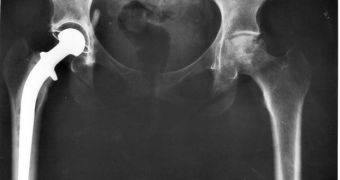Researchers have recently made a very interesting discovery in three children that had been born to mothers with metal-on-metal hip implants. These children exhibited relatively high concentrations of metal ions in their umbilical cord blood, especially of the metals chromium and cobalt. The researchers who made the finding say that mothers with this type of hip implant tend to pass some of ions (electrically-charged atoms) to their children, who are then born with excess of these two chemicals.
But the team highlights that the effects of these ions have yet to be assessed. They also say that this peculiarity is only encountered in pregnant women that have full metal-on-metal implants. These are medical equipments made of metal that replace both the socket and the “ball” at the end of the original bone. As the two grind past each other over time, their interactions and wear release excess ions, which then start making their way through the woman's body. If she is pregnant, then some of the ions will also get passed down to her child, the experts add.
“We don't know whether metal ions pose any health risks for pregnant women and their babies. But as metal-on-metal implants increase in popularity and use, especially among young, active patients, women of child-bearing age and their doctors need to be aware of these findings when considering options for hip replacements,” says orthopedic surgeon Dr Joshua Jacobs, from the Chicago-based Rush University Medical Center. He was also a researcher in the new investigation. The expert adds that the findings will be presented at the 2010 Annual Meeting of the American Academy of Orthopaedic Surgeons in New Orleans, LiveScience reports.
However, he points out the fact that the new investigation was only conducted on a very small study group, and that therefore more research is needed before doctors can say for sure that these “rogue” ions have any ill effects on the mothers or their babies. The investigators also evidenced the fact that the mother's placenta plays an important role in preventing at least some of the ions from getting through, but that it doesn't manage to stop all of them. Jacobs says that companies involved in producing prosthetics are already working on methods of reducing wear in their products, and that the flow of ions from these implants could soon be drastically reduced, or even eliminated.

 14 DAY TRIAL //
14 DAY TRIAL //